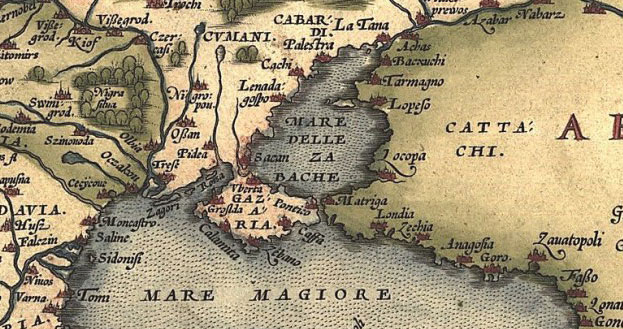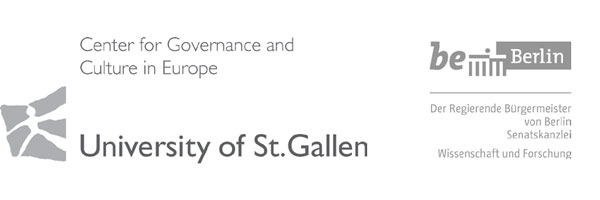
Winter Academy
26 Feb – 7 Mar 2018
NEC, Bucharest
Call for applications
Revisiting the Nation
Transcultural Contact Zones in Eastern Europe
Prisma Ukraïna – Research Network Eastern Europe, Berlin and the Center for Governance and Culture in Europe, Universität St. Gallen, in cooperation with the New Europe College, Bucharest cordially invite doctoral and postdoctoral scholars from the fields of anthropology, economics, geography, history, literature, political sciences, social psychology, sociology and other disciplines to apply for an international Winter Academy titled: “Revisiting the Nation: Transcultural Contact Zones in Eastern Europe”. The Academy will be convened from 26 February to 7 March 2018 in Bucharest, Romania.
Application deadline: 30 August 2017

Winter Academy
“Revisiting the Nation: Transcultural Contact Zones in Eastern Europe”
26 Feb–7 Mar, New Europe College (NEC), Bucharest (Romania)
Rationale
Ever since Mark von Hagen asked “Does Ukraine Have a History?” in 1995, there has been much debate about what constitutes Ukraine as a nation. In the light of recent developments, it might seem that in Ukraine, this question is of particular significance. Still, it is important to understand that in the European context, Ukraine is not an exceptional case in its nation building effort. Instead, it is exemplary in terms of its multiculturality, entangled histories, and the everchanging relation between state and society.
With regard to Eastern Europe, the preoccupation with ‘the nation’, its history and identity, and with similar categories that imply monolithic entities (state, culture, language) in political, social and even academic discourse has been prevalent at least since the final years and collapse of the Eastern bloc. It has been visible in a search for homogeneity and ‘essences’ in cultural, historical or political terms – a search thwarted by the realities in situ. It is not only that the newly found sovereignty of those nation states coincides with greater alignment with international legal, economic and military standards – what has been termed ‘voluntary imperialism’ (Cooper). Concepts like Mary Louise Pratt’s ‘contact zones’ (with their emphasis on transculturation, hybridity, and mediation) likewise draw attention away from monolithic concepts of nation and culture.
Instead, they point to how cultural practices permeate and inform each other at the local level, how they are being (re)negotiated and hegemonic discourses and power relations subverted by overt or implicit alternatives.
The ongoing transformations and cultural and political processes in Ukraine as well as in many places in Eastern Europe take place in this field of unresolved tension that causes constant frictions and renegotiations. This poses a very specific and potentially very productive challenge to Eastern European Studies – one that can benefit from the integration of various concepts and highly different disciplinary approaches.
The Academy’s rationale is to gather young scholars from diverse disciplines and with different approaches. We want to facilitate exchange and contribute to a fuller picture of current transformations in the region that goes beyond the national narratives and takes into account conditions and current processes of the renegotiation of identity, history, and political practices. The aim is to challenge assumptions; to overcome simplifying categories and explanations; and to open discussion on new perspectives and research questions. In this, Ukraine may be the main focus, but research on other countries and regions is welcome as well.
The program will focus mainly, but not exclusively on the following, overlapping themes:
The (re)production of community
identity claims and multiple belongings; the (re)production of memory and legitimacy; conflict and coexistence; nationalist mobilization and its limits; historical figures of the nation; history and nation building; populism and new authoritarianism
Legacies of empires
post-imperial infrastructures and the political and social life of its successors; inert geographies; shifting economic, political and cultural orientations; voluntary and involuntary imperialism; old and new elites; shadow economies; regionalisms and nationalism
Hegemonic and alternative discourses
sources of resistance; myths of pluralism; art, literature and the creation of (alternative) vernaculars; critical thinking and its institutional impact; subcultures; the fate of the left; diversity of memory and narratives; the role of mass media
Performing imagination
cultural production of the present; rhetoric of/as emotion; creative communities, common places for specific experiences; key images; interventions into the public space; mass culture as industry of imagination; transformation of literary cosmopolises; networks and islands in cultural mapping; experiences and performances of the Other
We invite scholars of anthropology, economics, geography, history, literature, political sciences, social psychology, sociology and other disciplines whose research relates to these questions and who would like to present and discuss their work in an international and multi-disciplinary context.
The Winter Academy is chaired by a group of scholars that includes Pascal Bonnard (Jean Monnet University, Saint Etienne), Rory Finnin (University of Cambridge), Susanne Frank (Humboldt University, Berlin), Olena Haleta (Ivan Franko University, Lviv; Ukrainian Catholic University, Lviv), Andrii Portnov (Prisma Ukraïna; Forum Transregionale Studien, Berlin), Ulrich Schmid (Centre for Governance and Culture in Europe, University of St. Gallen), Mihai Varga (Free University Berlin) and Annette Werberger (Europa University Viadrina Frankfurt/Oder).
Winter Academy format
The Academy will gather up to 20 doctoral and postdoctoral scholars from different countries and academic backgrounds. It promotes intensive peer-to-peer debates and encourages new perspectives grown from debates in small discussion groups. Participants contribute actively to the program’s structure and content. They present their individual research in working groups, co-design thematic discussion groups and are involved in the organization of workshops. While most of the intensive work is conducted in a small-group atmosphere, the Winter Academy also presents its work to the public through general lectures and open panel discussions. It builds on previous academies conducted by Prisma Ukraïna and is designed to support scholarly networks and contribute to closer ties among research activities in and outside of Europe. The working language is English.
The Academy will take place from 26 February to 7 March 2018 at the New Europe College in Bucharest. Travel, accommodation, insurance and visa matters will be covered and arranged by the organizers.
How to apply
The program addresses doctoral and postdoctoral researchers who wish to present their ongoing projects in a comparative perspective in relation to the questions raised above. Their work should be clearly relevant to the themes of the Winter Academy. While the focus of the Winter Academy will be on Ukraine and Eastern Europe, comparative perspectives on the themes mentioned above are welcome, transregional approaches being especially encouraged.
The application should be in English and consist of:
1. a curriculum vitae;
2. a three- to five-page outline of the project the applicant is currently working on, with a brief introductory summary thereof;
3. a suggestion of two readings relevant for the Winter Academy that you would like to discuss with other participants (please provide bibliographical data only, no copies required at this stage);
4. the names of two university faculty members who can serve as referees (no letters of recommendation required).
PLEASE SEND YOUR APPLICATION BY EMAIL as ONE PDF FILE to
prisma@trafo-berlin.de. Deadline for applications is 30 August 2017.
Contact:
Dr. Ulrike Gatzemeier
Prisma Ukraïna – Research Network Eastern Europe
Wallotstr. 14
14193 Berlin
T: +49 (0)30 89 001-428
F: +49 (0)30 89 001-440
About us
Located at the University of St. Gallen in Switzerland, the Center for Governance and Culture in Europe (GCE) collaborates with researchers in Germany, Vienna, the U.S., and the Black Sea region since its establishment in 2011. Affiliated members collaborate on a range of interdisciplinary projects, including State Capture and Corruption in Russia, and Transcultural Contact Zones in Ukraine. The GCE seeks to foster cooperation between humanities and social science researchers in Switzerland and individual states in the Black Sea region.
http://www.gce.unisg.ch
The New Europe College (NEC) Bucharest is an independent Romanian institute for advanced study in the humanities and social sciences founded in 1994 by Professor Andrei Pleşu. NEC aims to contribute to the development of research and higher education in Romania and in South-Eastern and Eastern Europe by: a) supporting individual research at an advanced level through national, regional and international fellowship programs; and b) hosting research teams and focus groups working on innovative and cooperative projects. NEC also aims to foster the development and strengthening of the civil society in the post-communist countries of South-Eastern and Eastern Europe.
Please find more information here: http://www.nec.ro
Prisma Ukraïna – Research Network Eastern Europe is a program at the Forum Transregionale Studien, Berlin. It links academics from numerous universities and research institutions in Berlin, Brandenburg and beyond who focus in their work on Ukraine and Eastern Europe. We provide spaces for interdisciplinary research with comparative approaches and thus seek to contribute to a language that does justice to the complexity of the region as a whole and opens up transregional perspectives. Prisma Ukraïna has been initiated and is being headed by the historian and long-term Fellow of the Forum Transregionale Studien Dr. Andrii Portnov.
Please find more information here: www.prisma-ukraina.de
The Winter Academy will be realized with the support of


